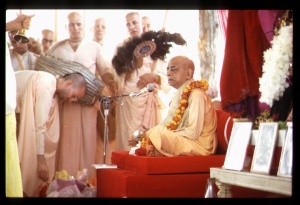SB 10.71.6: Difference between revisions
m (1 revision(s)) |
(Vanibot #0054 edit - transform synonyms into clickable links, which search similar occurrences) |
||
| (One intermediate revision by one other user not shown) | |||
| Line 1: | Line 1: | ||
{{info | {{info | ||
|speaker=Uddhava | |speaker=Uddhava | ||
|listener=Lord | |listener=Lord Kṛṣṇa the Supreme Personality of Godhead | ||
}} | }} | ||
[[Category:Srimad-Bhagavatam - Canto 10 Chapter 71|s06]] | |||
[[Category:Bhagavatam Verses Spoken by Uddhava - Vanisource|107106]] | |||
<div style="float:left">'''[[Srimad-Bhagavatam]] - [[SB 10|Tenth Canto]] - [[SB 10.71: The Lord Travels to Indraprastha|Chapter 71: The Lord Travels to Indraprastha]]'''</div> | |||
<div style="float:right">[[File:Go-previous.png|link=SB 10.71.5]] '''[[SB 10.71.5]] - [[SB 10.71.7]]''' [[File:Go-next.png|link=SB 10.71.7]]</div> | |||
{{RandomImage}} | |||
{{SBnotice}} | |||
==== TEXT 6 ==== | ==== TEXT 6 ==== | ||
<div | <div class="verse"> | ||
dvai-rathe sa tu jetavyo | :dvai-rathe sa tu jetavyo | ||
mā śatākṣauhiṇī-yutaḥ | :mā śatākṣauhiṇī-yutaḥ | ||
brāhmaṇyo 'bhyarthito viprair | :brāhmaṇyo 'bhyarthito viprair | ||
na pratyākhyāti karhicit | :na pratyākhyāti karhicit | ||
</div> | </div> | ||
| Line 17: | Line 22: | ||
==== SYNONYMS ==== | ==== SYNONYMS ==== | ||
<div | <div class="synonyms"> | ||
dvai- | ''[//vanipedia.org/wiki/Special:VaniSearch?s=dvai&tab=syno_o&ds=1 dvai]-[//vanipedia.org/wiki/Special:VaniSearch?s=rathe&tab=syno_o&ds=1 rathe]'' — in combat involving only two chariots; ''[//vanipedia.org/wiki/Special:VaniSearch?s=saḥ&tab=syno_o&ds=1 saḥ]'' — he; ''[//vanipedia.org/wiki/Special:VaniSearch?s=tu&tab=syno_o&ds=1 tu]'' — but; ''[//vanipedia.org/wiki/Special:VaniSearch?s=jetavyaḥ&tab=syno_o&ds=1 jetavyaḥ]'' — is to be defeated; ''[//vanipedia.org/wiki/Special:VaniSearch?s=mā&tab=syno_o&ds=1 mā]'' — not; ''[//vanipedia.org/wiki/Special:VaniSearch?s=śata&tab=syno_o&ds=1 śata]'' — by one hundred; ''[//vanipedia.org/wiki/Special:VaniSearch?s=akṣauhiṇī&tab=syno_o&ds=1 akṣauhiṇī]'' — military divisions; ''[//vanipedia.org/wiki/Special:VaniSearch?s=yutaḥ&tab=syno_o&ds=1 yutaḥ]'' — joined; ''[//vanipedia.org/wiki/Special:VaniSearch?s=brāhmaṇyaḥ&tab=syno_o&ds=1 brāhmaṇyaḥ]'' — devoted to brahminical culture; ''[//vanipedia.org/wiki/Special:VaniSearch?s=abhyarthitaḥ&tab=syno_o&ds=1 abhyarthitaḥ]'' — entreated; ''[//vanipedia.org/wiki/Special:VaniSearch?s=vipraiḥ&tab=syno_o&ds=1 vipraiḥ]'' — by ''brāhmaṇas''; ''[//vanipedia.org/wiki/Special:VaniSearch?s=na&tab=syno_o&ds=1 na] [//vanipedia.org/wiki/Special:VaniSearch?s=pratyākhyāti&tab=syno_o&ds=1 pratyākhyāti]'' — does not refuse; ''[//vanipedia.org/wiki/Special:VaniSearch?s=karhicit&tab=syno_o&ds=1 karhicit]'' — ever. | ||
</div> | </div> | ||
{{SBcollapse}} | |||
==== TRANSLATION ==== | ==== TRANSLATION ==== | ||
<div | <div class="translation"> | ||
He will be defeated in a match of single chariots, not when he is with his hundred military divisions. Now, Jarāsandha is so devoted to brahminical culture that he never refuses requests from brāhmaṇas. | He will be defeated in a match of single chariots, not when he is with his hundred military divisions. Now, Jarāsandha is so devoted to brahminical culture that he never refuses requests from brāhmaṇas. | ||
</div> | </div> | ||
| Line 31: | Line 36: | ||
==== PURPORT ==== | ==== PURPORT ==== | ||
<div | <div class="purport"> | ||
It might be argued that since only Bhīma could equal Jarāsandha in personal strength, Jarāsandha would be more powerful when supported by his huge army. Therefore, Uddhava here recommends single combat. But how could Jarāsandha be persuaded to give up the support of his powerful army? Here Uddhava gives the clue: Jarāsandha will never refuse a request from brāhmaṇas, since he is devoted to brahminical culture. | It might be argued that since only Bhīma could equal Jarāsandha in personal strength, Jarāsandha would be more powerful when supported by his huge army. Therefore, Uddhava here recommends single combat. But how could Jarāsandha be persuaded to give up the support of his powerful army? Here Uddhava gives the clue: Jarāsandha will never refuse a request from ''brāhmaṇas'', since he is devoted to brahminical culture. | ||
</div> | </div> | ||
__NOTOC__ | </div> | ||
</div> | |||
<div style="float:right">[[File:Go-previous.png|link=SB 10.71.5]] '''[[SB 10.71.5]] - [[SB 10.71.7]]''' [[File:Go-next.png|link=SB 10.71.7]]</div> | |||
__NOTOC__ | |||
__NOEDITSECTION__ | |||
Latest revision as of 19:50, 17 February 2024

A.C. Bhaktivedanta Swami Prabhupada
Please note: The synonyms, translation and purport of this verse were composed by disciples of Śrīla Prabhupāda
TEXT 6
- dvai-rathe sa tu jetavyo
- mā śatākṣauhiṇī-yutaḥ
- brāhmaṇyo 'bhyarthito viprair
- na pratyākhyāti karhicit
SYNONYMS
dvai-rathe — in combat involving only two chariots; saḥ — he; tu — but; jetavyaḥ — is to be defeated; mā — not; śata — by one hundred; akṣauhiṇī — military divisions; yutaḥ — joined; brāhmaṇyaḥ — devoted to brahminical culture; abhyarthitaḥ — entreated; vipraiḥ — by brāhmaṇas; na pratyākhyāti — does not refuse; karhicit — ever.
Translation and purport composed by disciples of Śrīla Prabhupāda
TRANSLATION
He will be defeated in a match of single chariots, not when he is with his hundred military divisions. Now, Jarāsandha is so devoted to brahminical culture that he never refuses requests from brāhmaṇas.
PURPORT
It might be argued that since only Bhīma could equal Jarāsandha in personal strength, Jarāsandha would be more powerful when supported by his huge army. Therefore, Uddhava here recommends single combat. But how could Jarāsandha be persuaded to give up the support of his powerful army? Here Uddhava gives the clue: Jarāsandha will never refuse a request from brāhmaṇas, since he is devoted to brahminical culture.